Birmingham student reveals what it’s really like to have leukaemia
This article contains affiliate links. We may earn a small commission on items purchased through this article, but that does not affect our editorial judgement.
and live on Freeview channel 276
Only 11% of people surveyed across the West Midlands recognised that repeated infections - one of the most common symptoms of leukaemia - are a symptom.
But this is not all - only 27% said unusual bruising is a symptom and only 8% said unusual bleeding is a symptom. Leukaemia Care and Leukaemia UK have released the findings as they launch a new campaign to help save lives by raising awareness of the blood cancer.
Advertisement
Hide AdAdvertisement
Hide AdOther symptoms not being picked up include fatigue - which is often the most likely symptom to be identified by those later diagnosed with leukaemia - yet only 44% of respondents recognised this.
Sophie Wheldon, aged 24, from Chelmsley Wood, was among those who had no idea their illness was so serious, but luckily she managed to turn the tide. She tells her story as a new film released today by Leukaemia Care and Leukaemia UK who are calling on the expertise of ‘Henry’, a talented Macaw parrot, to try to make the symptoms of leukaemia memorable.
The ad sees Henry using a range of objects to create a catchy and repetitive ‘Spot Leukaemia rap’ featuring the symptoms of leukaemia.
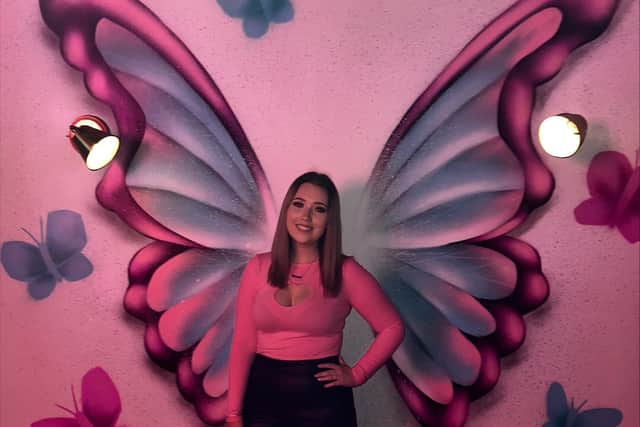

Here’s Sophie’s story to help raise awareness further
Sophie Wheldon, 24 from Chelmsley Wood, Birmingham had a nasty chest infection that wouldn’t clear.
Advertisement
Hide AdAdvertisement
Hide AdShe then began having intense headaches. Nothing would make them go away. She also developed a strange pain in her neck, which seemed to have come out of nowhere.
“It was very unusual. At the time I was studying biology at the University of Chester and had just finished my second year. Being diagnosed with Leukaemia came as a massive shock. I knew something was wrong but I never would have thought that it would be leukaemia.
“At first, I just put it down to being a student and being stressed with university,” she said, “but it just got to a point where the pain just wouldn’t go away. I went to the doctors and they urged me to go to the hospital to get checked out for meningitis. The doctor said ‘your headaches could be absolutely anything, but the neck pain… I don’t like that at all.’.”
“Throughout May of 2018, I had a bad chest infection that didn’t seem to shift for a long time, and then I started getting some extreme headaches in June. I went for an eye test but that came back fine, so I was a bit confused as to why I was feeling so strange.
Advertisement
Hide AdAdvertisement
Hide Ad“On the 27 June, my mum made an appointment for me with the GP. By this point I had also begun experiencing some really bad neck pain that felt worse than just sleeping funny on it.
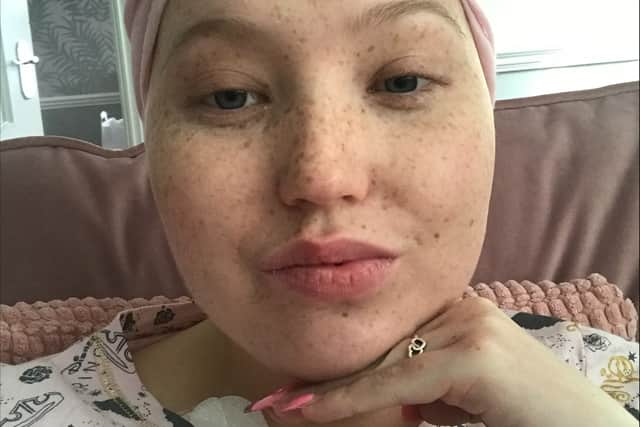

“The GP examined me and couldn’t quite point to a diagnosis, so he told me that he wanted me to go to A&E because I was a student, meaning the neck pain could be a symptom of meningitis. “I was rather blasé about this and wasn’t too worried about it. I also had a temperature which I initially shrugged off and just assumed was just because it was a hot day.
“My parents took me to our local A&E where I gave in a letter from the GP so I could be seen right away. I sat down with my mom to have my observations taken, and I remember the nurse staring really hard at the screen behind my head.
“He asked me, ‘Are you feeling okay?’ And I said, ‘Yes, why?’ I had to have a heart trace immediately and then before I knew it, this nurse had two phones to his ears and told us to follow him, as they were moving us to majors. My parents and I were confused but it was such a rush, it felt like we were running there.
Advertisement
Hide AdAdvertisement
Hide Ad“I was taken to a side room and told to wait for hourly observations and also a blood test. I was petrified at this point because I had an awful needle phobia and I had never even had a blood test before.
“After this I was taken to a kind of holding ward while they tried to figure out what was wrong with me, as my white cell count was sky high. The next day consisted of more tests, a full body CT and what I now know was a bone marrow biopsy.
“I was moved to a haematology ward, full of lovely old ladies who all had one thing in common – leukaemia. I was here because they didn’t know what was wrong, it was just something in my blood, not leukaemia.
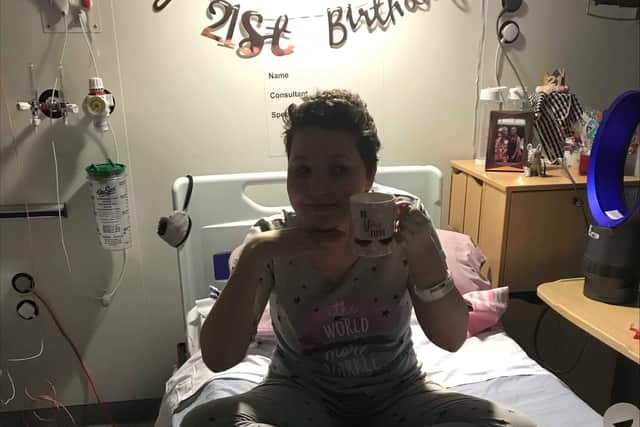

“Post transplant biopsy she noticed my original symptoms creeping back, including the headaches, neck pain and persistent infections. I was given another appointment to go into the clinic to see my consultant but my mum and dad were both at work, so my sister came with me.
Advertisement
Hide AdAdvertisement
Hide Ad“I didn’t realise that the appointment would be anything to worry about - I nearly took my friend with me. But then I heard that dreaded phrase again: ‘Where are your mom and dad?’
“At that moment, I knew that I had relapsed, and it was true. I was classed as terminally ill, until my doctor told me that I could be eligible for CAR-T therapy. Once again, another whirlwind.
“I became the first person in the West Midlands to have the treatment, the day after my 21st birthday on the 10th of June 2019. My cells were collected at the end of April ready to be sent off and manufactured into those amazing little CAR T cells.
“When they came back, there was just this tiny little bag - that was what would save my life. A 20-second infusion. It is so crazy to think that it’s even possible.
Advertisement
Hide AdAdvertisement
Hide Ad“The whole process involves taking out part of your immune system and your white cells and manufacturing them to essentially recognise and target the cancer cells.
“They pass your blood out one arm into a machine which spins really fast and it separates out your cells. The rest of your blood goes back in through there. And the T cells go into this bag which gets sent off to be manufactured in America. They add the CAR element and then put that back into you.
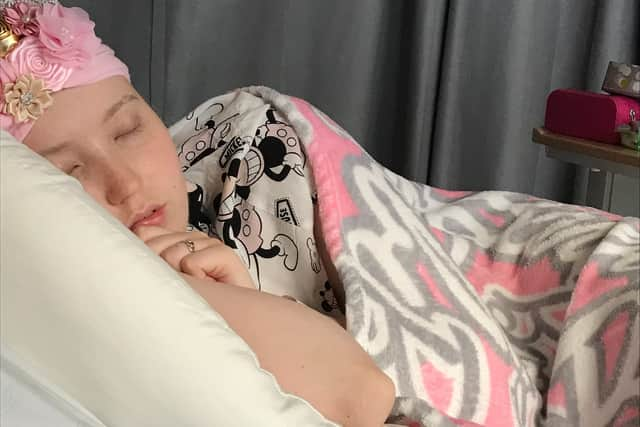

“So then these clever CAR T cells seek out the cells that are faulty, and for me that was the CD19+ B-cells, and then attack and kill them. It basically kills the cancer from within. Since I’m using my own cells, there’s no chance of rejecting them.
“There’s a few side effects to the treatment. One of them is called cytokine release syndrome (CRS) which is basically when your immune system has a massive reaction because the CAR T-cells are killing all this cancer and the immune system is like ‘whoa, what’s going on?’. So I was a bit unwell with CRS, but they gave me drugs to reverse it.
Advertisement
Hide AdAdvertisement
Hide Ad“After I was discharged from hospital, I was seen in the clinic three times per week to keep a close eye on my blood counts. I had to have a few platelet transfusions, but it was nothing that I wasn’t used to by that point! I was already feeling so much better. After being so unwell for so long, it was a welcome feeling.
“Then, 28 days later, I had a bone marrow biopsy so that the doctor’s could see if I was in remission, and whether the treatment had worked. On the 19 July, 2019, I was told the news that I had been desperately longing for for an entire year - ‘you are in complete remission’. It was literally the best day ever. I couldn’t believe that I could finally start getting my life back, getting ‘me’ back.
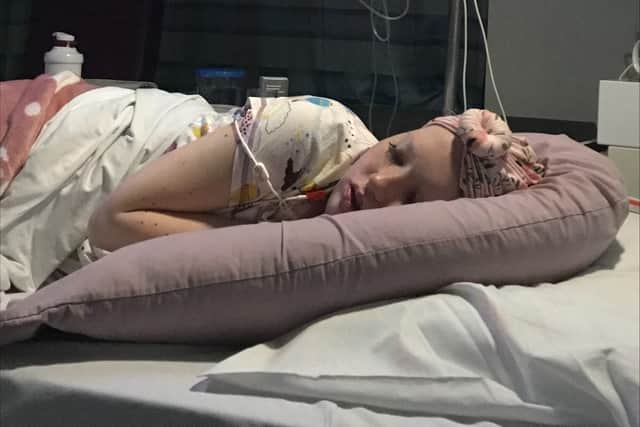

“The only downside is that the CAR T-cells kill all of the cells that have that CD19 label on, which means that I don’t actually have any B cells left and I still don’t have any, which is great because it means all of my T-cells have now learned that if they see this label, they need to kill it. “However, that also means I’ve got half an immune system now, so I have to be extra careful. I caught COVID last year which put me in hospital, and I had to have treatment for it again earlier this year. It can be tough. I’m just grateful to be here and to have been in remission for three years.
“Spot Leukaemia is incredibly important as it is vital for people to be educated on the signs and symptoms of leukaemia, to look out for not only themselves, but others around them.
Advertisement
Hide AdAdvertisement
Hide Ad“The symptoms of leukaemia can be so vague and easily overlooked, but always trust your instincts. You know your own body - if you feel that something isn’t quite right, just go to the GP as soon as you can. Leukaemia needs to be diagnosed as soon as possible, so everyone should know what to look out for.
“Everyone knows that the symptoms of leukaemia are very vague and this is why Spot Leukaemia is so important. You know if there’s something not right with your body. You should always follow your gut instinct and get checked out.”
What to do if you think you may have Leukaemia symptoms?
People who are concerned about any of these symptoms - fatigue, bruising, unusual bleeding and repeated infections – are being strongly urged by the charities to contact their GP and request a blood test. More information is available on the Spot Leukaemia website at www.spotleukaemia.org.uk.
A message from the editor:
Thank you for reading. BirminghamWorld is Birmingham’s latest news website, championing everything that is great about our city - reporting on news, lifestyle and sport. We want to start a community among our readers, so please follow us on Facebook,Twitter and Instagram, and keep the conversation going.
Comment Guidelines
National World encourages reader discussion on our stories. User feedback, insights and back-and-forth exchanges add a rich layer of context to reporting. Please review our Community Guidelines before commenting.
